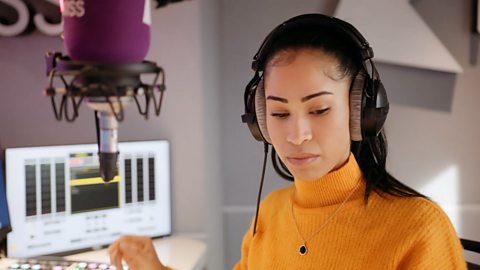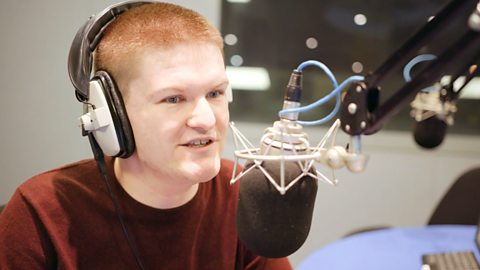Meet Katie and find out about her life as a TV and radio presenter. Katie presents a radio show called Life Hacks on BBC Radio 1. Part of our Bitesize world of work series.
Katie Thistleton - TV and radio presenter
I present a show called Life Hacks on BBC Radio 1 and that means I have to talk about various different things that are affecting young people, so whether that’s social action issues or mental health, I just have to basically talk for a living, which I never stop talking anyway, so I just do that and get paid to do it some days!
So I always wanted to be a writer when I was younger and then someone said to me ‘you can't really make any money unless you've got the next Harry Potter up your sleeve’ so I thought, ‘well, I'll be a journalist and that way I can write for newspapers and magazines’ so I did a journalism qualification and I started doing work experience at different community radio stations in the newsroom and while I was there I realised that broadcasting seemed a lot more fun than writing for papers so I was working for Cbeebies and I was helping to write scripts and set up all the recordings and then randomly they were looking for a new girl presenter on CBBC to join Hacker so I was asked to go and audition, but it was totally out of the blue because I never wanted to perform, particularly. Sometimes I think your career just sort of goes on a bit of a funny route but if you really are passionate about something then you’ll get there in the end.
My favourite subjects at secondary school were English, media studies, drama and it's quite obvious I suppose that those things would help me on what I went on to do. So I would say to people who are nervous and shy in class at the moment, I used to be that person who couldn't put my hand up without going bright red and wishing the ground would swallow me up but you've just got a force yourself into it, you’ve got to put your hand up, ask those questions, be the one that volunteers to read out and then a few months’ time that'll have just gone and you’ll feel confident.
If you want to be a presenter I would say really think about why you want to be. Is it because you love the buzz of TV and radio and the media and you want to be in that environment? If so, I would say start working behind the scenes. That's what I did, you get a really good knowledge of how it all works and if you're the right person for a presenting job, then hopefully that’ll happen for you. If I wasn't working as a radio presenter, I would be at home reading books, I’d be writing, I'd be telling stories. I’d probably do my own community radio show still. So if you make your hobby into your job, you are always going to be passionate about it and even when it’s a long day or you’re stood in the rain, you still going to love it.
I basically talk for a living.
Katie is a radio presenter for Life Hacks on BBC Radio 1. On her show, she talks about various issues that are affecting young people, such as social action and mental health
Writing has always been something that appealed to Katie and she channeled her interest into a course in Journalism. Once working in journalism, she switched to broadcasting which she thoroughly enjoyed. When a presenting job came up, she went for it and made the step to a TV/radio presenter
It might be surprising but "I was always shy at school", Katie admits. Her advice to those like her at school is to "just go for it!". She suggests pushing yourself, to step out of your comfort zone, put your hand up in class, make yourself heard and hopefully your confidence will grow
If you're interested in a career as a presenter, Katie's top tip is to get as much work experience as possible, start working behind the scenes and get a really good knowledge of what's going on.

A similar job to a radio presenter is a DJ (disc jockey). DJs play music for audiences in live venues, at events or on the radio.
What to expect if you want to be DJ
- DJ average salary: Variable. You may be self-employed/freelance
- DJ typical working hours: 45 to 47 hours per week.
What qualifications do you need to be a DJ?
You could get into this role via a college course (such as a Level 2 certificate, a Level 3 Diploma or a T-level in Media, Broadcast and Production - England-only, from Sept 2023). You can also volunteer at community or hospital radio stations, or DJ at events like parties, weddings and charity shows. Alternative routes also include taking training courses or attending DJ workshops. You can also apply directly if you have relevant experience.
Sources: LMI for All, National Careers Service, GOV.UK
This information is a guide and is constantly changing. Please check the National Careers Service website for the latest information and all the qualifications needed and the GOV.UK website for more on T-levels.
For careers advice in all parts of the UK visit: National Careers Service (England), nidirect (Northern Ireland), My World of Work (Scotland) and Careers Wales (Wales).

Work experience in your area
Find work experience placements with Workfinder.
Tips and advice
Help with interviews, writing a CV and all things work experience related.

Swarzy: radio presenter. video
Swarzy's a radio presenter for Kiss FM.

Careers A to Z: Find your perfect job
From actor to zoologist, find the right fit for you.

Chris: radio presenter and producer. video
Chris is a radio presenter and producer for Metro Radio in Newcastle.
